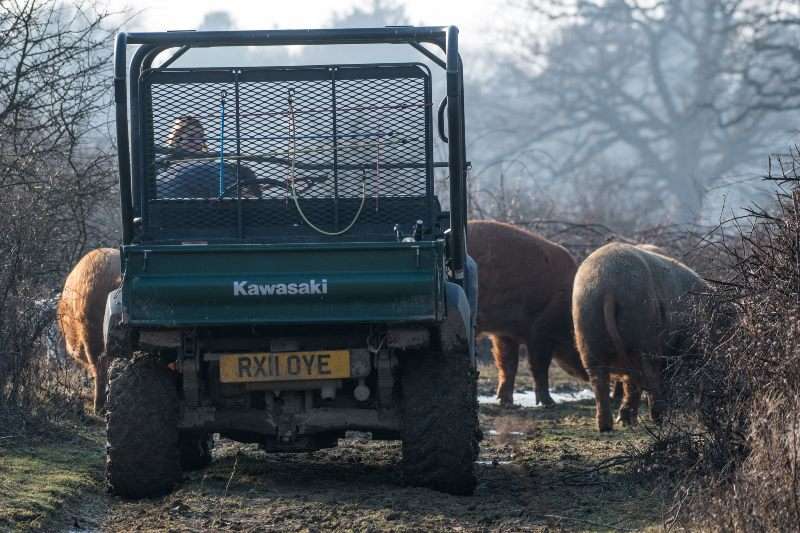Model Village for Alzheimer's Patients in France Makes Residents Feel Like They're Still Independent
Near the French city of Dax, a village has been created with the specific needs of its 105 residents-all of whom suffer from Alzheimer's.

In southern England, a struggling farming estate with a 19th-century castle that had been in the Burrell family for over 200 years was low on cash, but a drastic change from farming to biodiversity conservation has given the old manor house a new lease on life.
The 3,500-acre estate in West Sussex, about 41 miles south of London, was seemingly cursed with low farming yields when Charlie Burrell finished agriculture school in the 1990s.
Burrell, who inherited the estate aged 21, had several years of unsuccessful farming before he knew he needed a radical change as unpaid expenses began piling up.
After he came to the realization that his fields would not produce anymore through conventional agriculture, he considered applying alternative methods to managing his property.
His change was indeed radical, but also successful, with Knepp Estate becoming one of the largest and most prosperous rewilding projects in the history of Britain.
"Instead of conserving with specific species in mind where you're focusing on keeping a habitat, locking it down as it is, so that that preserves the numbers of certain species, what we've done here is just taken our hands off the steering wheel and just stood back and let nature take over," explains the aptly named Isabella Tree, Charlie Burrell's wife, and co-director of the rewilding project on the estate.

An extreme method of conservation, rewilding involves returning an area of land to its natural state—completely natural. This is usually done by, as Isabella said, "taking our hands off the steering wheel," but can also require more hands-on approaches.
A wild landscape has wild animals, and so the first step for Knepp was returning large mammals to the Knepp Estate fields and thickets, including fallow, roe, and red deer, Tamworth hogs, Exmoor ponies, and longhorn cattle, as the actions of these animals on the environment creates a very unique reaction from the land.
"Disturbance from grazing, browsing, rootling, rubbing and trampling, provides a check on [overgrowing] scrub; and the battle between these two processes–animal disturbance vs vegetation succession–creates all sorts of vegetation structures which contribute to a dynamic, ever-shifting mosaic of valuable habitats," explains the Knepp Rewilding Project website.
The movement of large herbivores is key to ecosystem health, as their dispersion of seeds and nutrient-rich dung ensures that trace elements of key nutrients are moved hither and yon in a randomness that leads to the creation of dynamic ecosystems.
While setting all the normal wild pieces on the wilderness board and letting them do their thing may sound like complete anarchy, in nature there tends to be an order inside of her chaos, one which is difficult to create with human hands.
The rewilding project at Knepp has created one of the most biodiverse areas in all of Britain. The estate grounds act as home to nearly all English megafauna, as well as the rarest mammal in Europe, the barbastelle bat.
Rare birds such as turtle doves, nightingales, peregrine falcons, white storks, and all five species of owls found in Great Britain inhabit the grounds, while one summer the Butterfly Conservatory counted 87 male purple emperor butterflies, an exceptional number for anywhere in England.
At the heart of the Knepp Estate is the River Adur, which was restored to a natural state in 2011 with help from the British government by removing four separate weirs and filing in agricultural drainage canals.
The restored wetlands surrounding the river's natural meandering path play host to wading birds, amphibians, water insects, sea trout, and other fish, and important endangered wetland plants like the black poplar.
For Charlie and Isabella, their monetary problems disappeared like their once-fallow fields, and along with controlling the herbivore population with free-range organic wild meat, the estate offers camping and "glamping" in a shepherd's hut, nomad's yurt, and tree houses. They also offer safari tours of the grounds, fishing, photography workshops, and rewilding courses.
They hope their success can act as incentive to other farmers who may own sub-standard fields and are looking for othservationer ways to utilize their land.
(WATCH the farm in action in the video below.)
Multiply The Good News By Sharing It With Your Friends On Social Media…
Be the first to comment